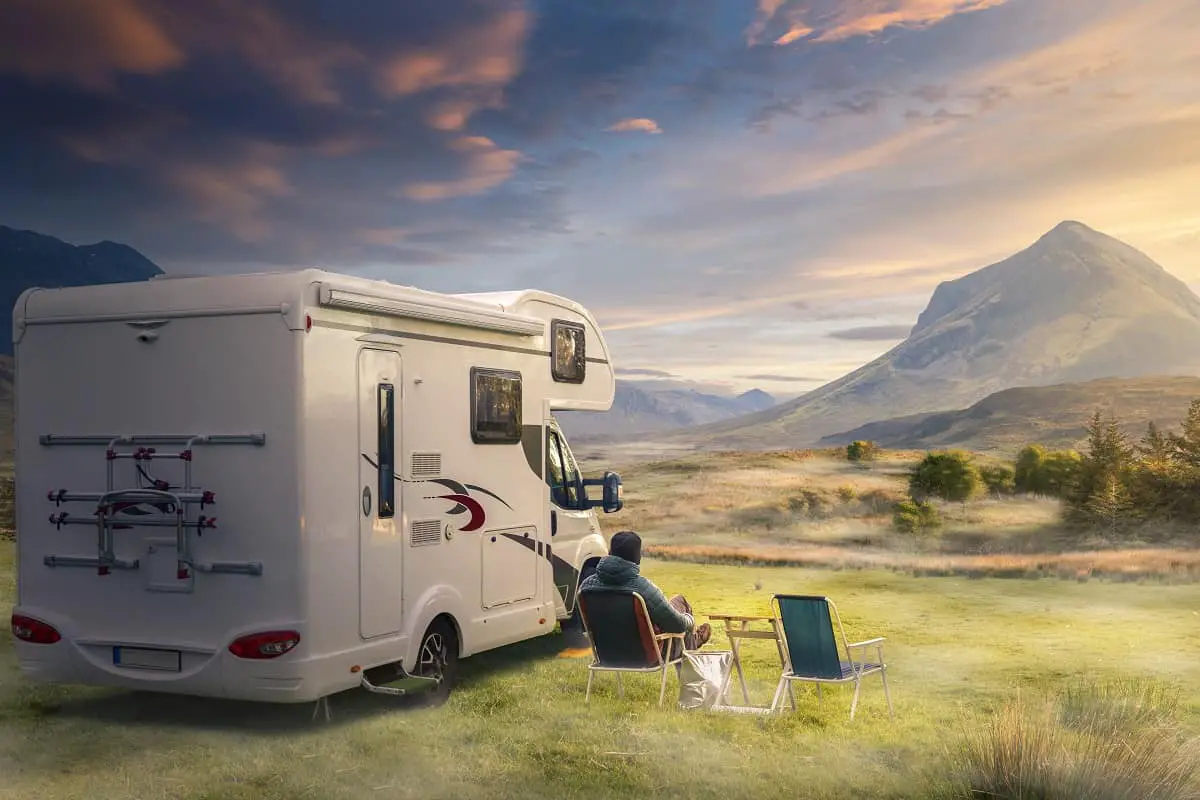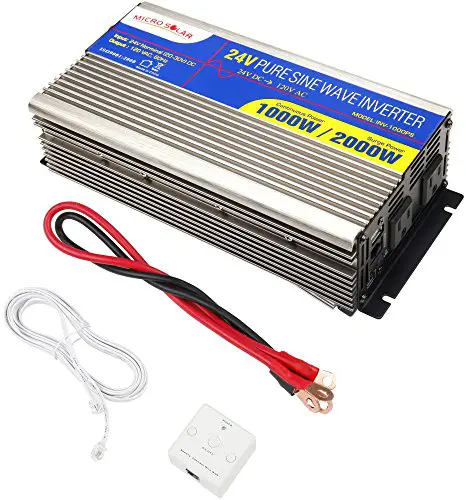
Powering up your RV while you’re at camp
To start things off, we should probably discuss a few preliminary things which will be vital to your understanding in this process of learning about motorhome inverters. After all, if you have clicked on this article, then you most likely do not know much about inverters.
In this article, we will discuss topics such as what exactly a motorhome inverter is? Do you even need an inverter for your motorhome? And how do you make sure you choose the proper one? And let us not forget – we will answer how to use inverter in motorhome. Read on to find out more.
Mike at RV Lifestyle made a good video why you would want install one of these.
Do you even need an inverter?
If the outlets in your motorhome do not work unless they are connected to an electrical source, such as a generator or solar panels, then your motorhome most likely does not have a built-in inverter. Since you lack an inverter, it will be in your best interest to get one in order to make your mobile-living experience much more comfortable and hassle-free.
Make sure you read our guide to avoiding RV brands with problems.
What is a motorhome inverter?

Inverters can make your life much easier.
They will always be inside of your motorhome, so you no longer have to worry about lugging around a generator. An inverter is an electronically powered device that takes about 120 vacuoles of power to run.
If you want to camp, or even live off the grid, then an inverter is what you need. It allows you to have most of the commodities which you would normally only be able to enjoy at home, in your motorhome. With this electrical gadget, you can watch TV, power up your electronic devices and much more all while living off the grid! And don’t worry if you do not have one in your motorhome currently; you can always install one whenever you feel like it.
How do inverters work?
Although inverters allow you to live off the grid, something still has to power said inverter, and that thing is batteries. The typical motorhome inverter requires 12-volt batteries, which will then generate enough power to bring 120 Vacuoles of power to the outlets.
Technically, an inverter could drum up enough electricity to power all the electronic devices in your motorhome. Sadly, this theory is put to an abrupt halt when you realize that your inverter can only supply as much power as you give it. So if you want to use the entire power grid of your town to power it, you could then have unlimited power. (But don’t actually do that because you would just end up in jail and with a fried inverter!)
Scientifically speaking, the power that comes from your power source (in this case it’s the batteries) will multiply by ten once run through the inverter. This means that items such as air conditioners and hair tools that take large amounts of power will drain the batteries at alarming rates.
To put this in layman’s terms, the batteries have a set amount of power, and the inverter draws from that power. When transferring the power into whatever appliance you are trying to use, you will end up using ten times the amount of power you originally had in your battery. This is all due to the laws of electricity, and this means that your inverter has an electricity turnover rate of 90%-95%, which is the average amount for an inverter.
Because motor home batteries only hold about 60 amperes for an hour, you can see why it would not be wise to try to run power-heavy items on an inverter. Unless you want to be changing your batteries every hour or so.
Read more common questions about inverters here.
6 things to consider before buying an RV inverter
You should do a lot of thinking before buying an inverter. Because each one is slightly different, you need to pick an inverter that is right for your needs. The most important thing you should decide is the amount of power you will want from your inverter. This will then dictate both the size and price of the device you will eventually purchase.
The second most important thing you should think about is how you will actually install your brand new inverter. Are you replacing the one you have? Will you have to rewire the whole system? Will you do it yourself or hire a professional? These are all questions you should consider and add to the total cost of getting an inverter. Now that you have a better idea about what to consider while choosing an inverter, let’s dive a bit deeper into this subject.
What will you power?
I know it seems the most appealing to power all of your appliances and electronic devices, but you have to consider the amount of power that will take. As discussed earlier, the more power you need, the more power you must have. That can cost you a pretty penny.

On the opposite end of the spectrum, some will only want to use the bare minimum of electricity. This method is great, and you won’t have to worry about batteries for a long time, depending on how little electricity you use.
No matter which end of the spectrum you are, know that there always options. In some cases, I would recommend using two or more inverters and then have specific ones for specific devices. For example, you would have one set for your refrigerator and microwave and then another for your television and phone chargers.
Choosing how to wire your inverter
In order to correctly wire your inverter, you will first need to map out where you want your power to go, how much power you want, and have some general knowledge of your motor home’s layout. I know I’ve said this enough times already, but you need to consider the price for all of this. There is no feeling worse than when you complete a project but then realize that you don’t have the funds to power said project.
Choosing the perfect inverter
The first thing you should consider when you go out to buy an inverter is the size, and I don’t mean the physical size. By that, I mean the amount of power it outputs. The average motorhome owner finds that a 1000-2000-watt inverter is sufficient for them to live comfortably. Just keep in mind that what works for one person may not work for you. You might only need 500 watts if you only want to charge your electronics, or perhaps you need 3000 watts. Both are feasible amounts.
If you want to get more technical, you can calculate the average amounts of watts you will need by going to an online watt calculator.
The second thing you will need to consider is the type of inverter you want. This will vary depending on if you already have an inverter or are getting a brand new one. Standalone inverters are what you will want to buy if this is your first inverter for our motorhome. If you are simply replacing an older inverter, then you will want to buy yourself an integrated type to make installation easier.
How to install an inverter
Jared at All About RV’s did a good video on choosing an inverter and wiring it in your RV. Give his video a watch to learn more.
The actual act of installing an inverter is quite easy. You wire it directly in. The tricky part comes with transferring the voltage to the correct location and in the correct amounts. You will first need to disconnect all the outlets that you want to direct power to, and connect them to the inverter.
The simplest way to direct power to the outlet is to use some basic wires and extension cords from the outlet to the inverter. If you want to be fancy, you could wire the entire thing, but this is especially difficult in a motorhome due to the thin walls that they usually have.
Import things to remember
You need to be sure that the converter or charger will never gain power from the inverter if you are going to be using a standalone inverter. You also need to ensure that the power from any other source you may have and the inverter power never deliver to the same outlet. This may damage your outlets or even cause a fire.
Just remember: if you do not feel confident in your skills as an amateur electrician, hire a professional. It’s better to spend a little extra and be safe rather than die in an electrical fire.
Are they reliable?
The majority of good, modern inverters are quite durable. Although they cannot withstand wet climates and the heat, they will typically last you a few years. To counter the heat factor, inverters usually have built-in cooling devices. Just be wary that these devices will build up dust and must be cleaned every now and then.
Alternatives
Generator
If you want to go off the grid, but don’t want to deal with an inverter, then a generator is the next best thing. They can do about the same things, but it’s not recommended to use a generator as a long term solution because they are rather noisy and large.

Solar power
The second alternative is solar power, but that is unreliable and extremely expensive. Also, the amount of voltage you get from them varies from day to day, and it can be unreliable, depending on your location.
Conclusion
In conclusion, inverters are your best bet for living off the grid. They are relatively easy to use, and as long as you get the correct one for your needs, it will significantly improve the quality of living for your motorhome. Just make sure that you are safe with the installation and always consider the price after batteries, installation, and upkeep. Hope you have learned how to use inverter in motorhome and have a great trip!
Now that you are powered-up for camping, make sure your RV is in style by washing and polishing it!